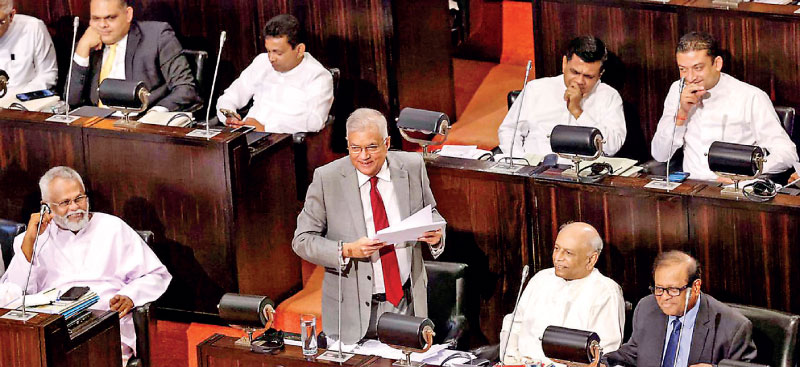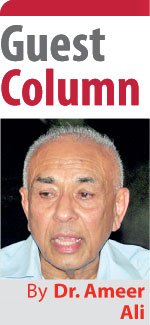Saturday Feb 14, 2026
Saturday Feb 14, 2026
Monday, 20 November 2023 00:00 - - {{hitsCtrl.values.hits}}

 The President/Finance Minister Ranil Wickremesinghe’s 2024 Budget, that could be his final one before going for a presidential election, reflects the impossibility of satisfying the conditions stipulated by the IMF more than a year ago and the expectations of a citizenry caught in a wave of unrelenting economic distress. While the release of the second tranche of $ 300 million from the $ 2.9 billion IMF loan hinges on how lenient the lender would be after witnessing RW’s failure to undertake vital reforms and particularly, to bring down Sri Lanka’s gaping Budget deficit, people’s reception to the Budget is certainly not going to be positive, because of the gap between what the Budget offers and what people need. In short, the 2024 Budget is in crisis already, despite RW declaring it “a success as it was an important change for the better to usher in economic prosperity and good governance”. This false confidence ignores the financial burden yet to be decided by negotiations over debt restructuring and the growing global economic pessimism caused by the two wars with imperial overtones, one in Ukraine and the other in Palestine. In a country mired in polycrisis a budget crisis should not come as a surprise.
The President/Finance Minister Ranil Wickremesinghe’s 2024 Budget, that could be his final one before going for a presidential election, reflects the impossibility of satisfying the conditions stipulated by the IMF more than a year ago and the expectations of a citizenry caught in a wave of unrelenting economic distress. While the release of the second tranche of $ 300 million from the $ 2.9 billion IMF loan hinges on how lenient the lender would be after witnessing RW’s failure to undertake vital reforms and particularly, to bring down Sri Lanka’s gaping Budget deficit, people’s reception to the Budget is certainly not going to be positive, because of the gap between what the Budget offers and what people need. In short, the 2024 Budget is in crisis already, despite RW declaring it “a success as it was an important change for the better to usher in economic prosperity and good governance”. This false confidence ignores the financial burden yet to be decided by negotiations over debt restructuring and the growing global economic pessimism caused by the two wars with imperial overtones, one in Ukraine and the other in Palestine. In a country mired in polycrisis a budget crisis should not come as a surprise.
Revenue enhanced only by increase in VAT
Without accounting for the failure to achieve targets set out in the previous Budget, a historical legacy in Government budgeting since 1948, new plans to spend seven trillion rupees against a revenue of four trillion leaves a deficit of Rs. 3 trillion, which is an increase of 19% from the 2023 deficit, and 9.1% of GDP. The IMF is certainly not going to be happy about this increase which would make it harder if not impossible to reach the set target of 2.5% primary surplus by 2025. While the recurrent expenditure includes an increase in cost-of-living allowance to 1.3 million state employees and 700,000 pensioners, and tripling the allocations for the Aswesuma welfare project, revenue is enhanced only by an increase in VAT from its current 15% to 18% with no other increase in direct taxes or the introduction of new ones. The moneyed class is therefore spared partly because taxing the rich is against the philosophy of economic liberalism and the IMF, and partly because RW needs the support of this class at the next election. Politics always intrudes to blunt the sharpness of Government’s economic instruments. To cover the expenditure therefore, the Government has to borrow from domestic sources, and the Budget has raised the borrowing limit by 3.45 trillion from the previous 3.9 trillion, to 7.35 trillion. Primarily, how would the Budget stem rising prices in the market that has no correlation with the highly acclaimed fall in inflation?
There is nothing unique about this Budget. Promises are one thing but delivering them quite another. Without ending corruption which has become systemic, and without introducing radical changes to improve public administration and public enterprise management, the gap between promises and delivery is set to continue. On the contrary, this Budget demonstrates how difficult if not impossible it is for any Finance Minister presiding over a bankrupt economy to produce at least a balanced Budget within the existing political and economic paradigm. It was only Dr. N.M. Perera who produced a surplus Budget in 1970 with the hope of changing that paradigm but he too failed. Now, RW in his role as Finance Minister reminds the people that, “The economic and political system of our country must be created anew. A new social consensus should be established”. It needs more than a social consensus. It requires a strong political will to change the political culture. In fact, that was the essence of the demand by the aragalaya youth in 2021. Having put down that short but historic uprising, and benefited by becoming President, RW did nothing to change that culture and the system which produced it.
Reforms to improve domestic governance neglected
Having welcomed the IMF to steer the economy’s revival, reforms needed to improve domestic governance and efficiency were tragically neglected. The IMF pointed it out in its report after auditing the progress made since RW received the first tranche. RW has already said that he would be selective in implementing those reforms, and it need not tax one’s brain too much to conclude that his selection would be politically dictated. Even if one ignores for a moment that IMF reforms are focused more on stabilising the financial sector of the economy and encouraging the moneyed class to take the lead in promoting economic growth and development rather than in the general welfare of the citizenry, it is doubtful whether the expected stabilisation and encouragement would have delivered robust economic growth with a system of governance that is corrupt, undemocratic and unjust. For example, according to RW, “2024 Budget signals the biggest ever privatisation and pointed to landmark proposals of the Urumaya program, which involves handing over of ownership of lands already distributed to two million farmer families as well as vesting full ownership of houses in Government-built schemes and land for dwellers in plantation and expanding the Bimsaviya program”. This in other words means legalising an act of privatisation already accomplished. But will there be transparency in this legalisation where vested interests are already at loggerhead with the original distribution. When it comes to plantation dwellers who are predominantly Tamils of Indian origin how would RW face opposition from Sinhala nationalists who are bent on reducing Tamil concentration in the hill country in the first place? Even the proposed cost of living allowance is not going to be paid immediately, but only from April next year and arrears to be received in instalments from October. This unnecessary delay would induce the beneficiaries to borrow in advance and invariably fall into an unwanted debt.
Political interest of President overtakes commitment to clean corruption
Let the economists and statisticians debate over the quantified variables of the 2024 Budget equation. But what is crucial from the point of view of Sri Lanka’s future is the political and social framework within which this Budget like all its predecessors is set to be implemented. With a Parliament of the current 225 and a Government made up of individuals and groups that were primarily responsible for the 2022 economic calamity and financial bankruptcy what hope is there for RW’s Budget to bring “change for the better to usher in economic prosperity and good governance”? Corruption for example, demands the existing political culture to continue but the economy demands its eradication. In between the two stand the actions of an executive President. Every act of RW whose slap on the wrist of a parliamentarian caught for smuggling through the VIP lounge at the Katunayake airport to the saga over the Sri Lanka Cricket Board, it is the political interest of the President that overtook his commitment to clean corruption. It is corruption that allows big companies to get away with tax evasion and the rich to stack away surplus funds in tax havens. The second Pandora Box files implicated a cabinet minister in RW’s Government who has stacked away funds in Virgin Islands. The first one too implicated a couple from the Rajapaksa dynasty and the investigation over that was never published. On the latest scandal there is silence from RW.
The question that faces the nation today therefore, is not about the economic credentials or efficacy of the 2024 Budget, but about the system that continues to produce budgets like this with eloquent promises without accounting for their delivery. Unless the system is overthrown with its political culture what hope is there for the future?
Time to take a new direction
None of the political parties represented in Parliament except the JVP/NPP has made any commitment to change the system. The JVP/NPP looks different because it is the product of a different generation and its economic ideology is left oriented. However, its leftism cannot coexist with the existing corrupt and ethno nationalist political system and culture, and that system and culture have to be thrown out. It is an intergenerational necessity. Even then, its radicalism has to be pragmatic and should not be driven by pure ideology to cope with the ruling international neoliberal environment. The JVP/NPP think tank seems to be aware of this. It is time Sri Lanka takes a new direction and the sooner it happens the better for the country and its multi-ethnic society.
(The writer is attached to the Murdoch Business School, Murdoch University, W. Australia)